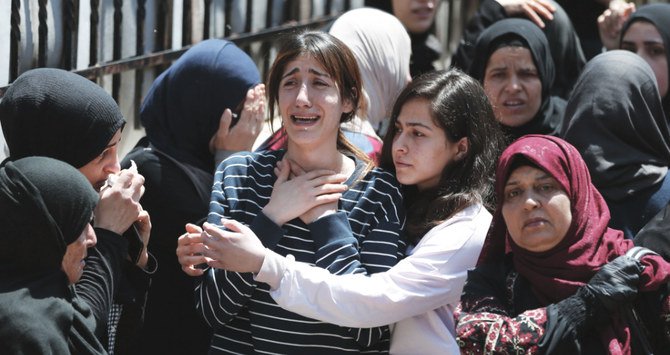
- ARAB NEWS
- 29 Apr 2024

Hazem Balousha
GAZA CITY: Thousands of Palestinian prisoners being held in Israeli jails are facing up to Ramadan without their families.
For around 7,000 inmates the joy of taking iftar with their children and relatives will be nothing more than a nostalgic memory.
Prisoner Ibrahim Al-Shaer has missed celebrating the month of fasting with his parents, wife and family for six years.
“I will never forget the first day of Ramadan in prison, I was surrounded by the memories of freedom. I felt the need to cry but I prevented myself, as I was shy from my cellmates. But they understood my feelings and gathered around me, and their presence by my side helped me to overcome those feelings,” he said.
In a bid to beat homesickness, Palestinian inmates try to recreate a Ramadan-like atmosphere inside the prison walls, but it can be difficult. Israeli prison authorities do not allow them to perform Taraweeh prayers and often deprive them of certain food items.
Speaking about his early days in prison during Ramadan, Al-Shaer said: “We began to prepare food before the Asr (evening) prayers. We had to start a bit early because we had only one stove inside the cell and the occupation forces allowed only selected items in the prison.”
Former prisoner, Ihab Budair, said that harsh conditions accompanied by poor medical provision, increased inmates’ suffering during Ramadan, adding that arbitrary measures and searches took their toll on the mental health of prisoners.
He alleged that prison staff often carried out sudden nighttime inspections of cells, offered inappropriate foods to Muslims, and prevented high-profile prisoners from mingling with fellow inmates.
Another former prisoner, Thamer Saba’neh, said: “Every month in captivity is similar to the month of Ramadan. The prisoners begin to store the essentials for Ramadan, especially dates, much earlier. The announcement of the beginning of the month is greeted with feelings joy and grief.”
Media spokesman for the Palestinian Prisoners’ Center for Studies, Riyad Al-Ashqar, said that any hopes of inmates creating a Ramadan atmosphere of worship and happiness in jails had been dashed by the Israeli prison authorities who provided poor-quality food and upped canteen prices during the fasting month.
Al-Ashqar added that prisoner transfers often doubled during Ramadan, which raised tensions among inmates, and Israeli authorities increased the frequency of court hearings in the holy month causing prisoners to become tired when having to travel long distances to attend sessions.
Prisons also placed restrictions on the purchase of special Ramadan items such as dates, olive oil, and ingredients used to make sweets, Al-Ashqar said.